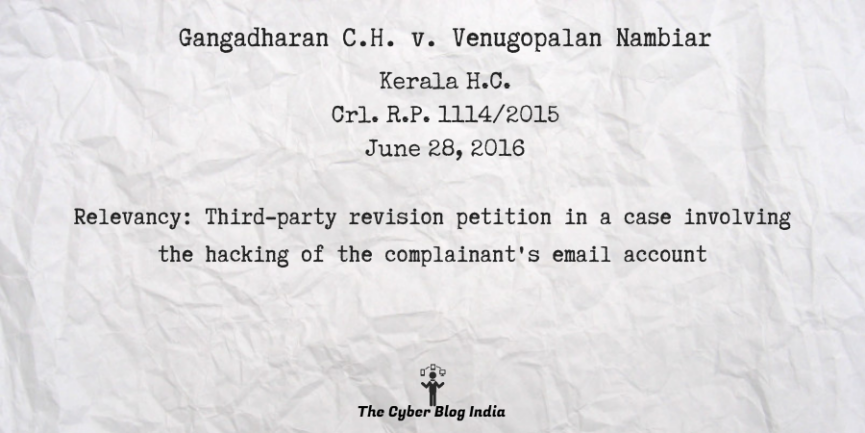Gangadharan C.H. v. Venugopalan Nambiar

Gangadharan C.H. v. Venugopalan Nambiar
In the High Court of Kerala
Crl. R.P. 1114/2015
Before Justice Sunil Thomas
Decided on June 28, 2016
Relevancy of the case: Third-party revision petition in a case involving the hacking of the complainant’s email account
Statutes and Provisions Involved
- The Information Technology Act, 2000 (Section 66A, 66C)
- The Code of Criminal Procedure, 1973 (Section 239)
Relevant Facts of the Case
- Respondent 1, the head of the department, allegedly hacked the de facto complainant’s e-mail account using her password and sent intimate messages to himself and another person, to defame her. This was done from the computer installed at his house.
- The accused (Respondent 1) was not charged under Section 66A (being unconstitutional by then) and Section 66C as there was no material depicting the dishonest use of password or identification feature of the de facto complainant. Thereafter, the accused was discharged under Section 239 of the Code of Criminal Procedure, 1973.
- Hence, the present Revision Petition is filed by the de facto complainant.
Prominent Arguments by the Advocates
- The petitioner’s counsel claims that the de facto complainant is not eager to prosecute the matter due to threats and coercion of the accused. Hence, he is prosecuting the matter on behalf of her.
Opinion of the Bench
- There was no material to show the commission of an offence under Section 66C of the Information Technology Act, 2000. Moreover, the statement of the Nodal Officer of BSNL only shows the IP address related to the broadband connection of the house of the accused. The petitioner seemed actuated by personal reasons to keep the case going.
Final Decision
- Revision petition dismissed.
This case summary has been prepared by Nandini Gadgil, an undergraduate student at DES Shri Navalmal Firodia Law College, Pune, during her internship with The Cyber Blog India in January/February 2021.
